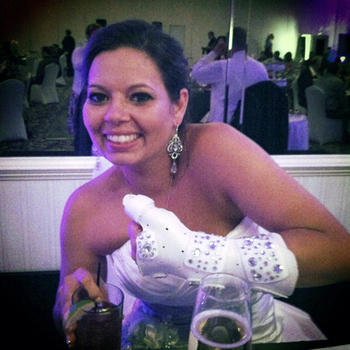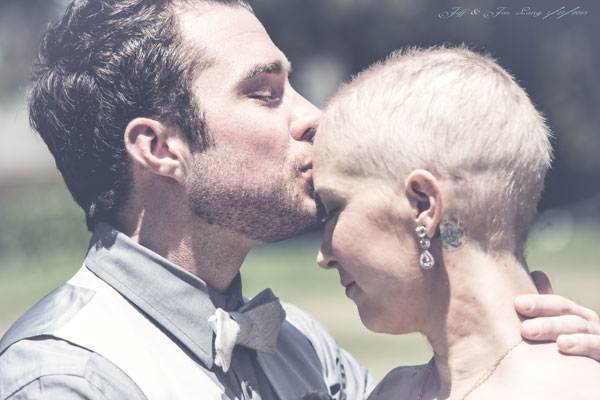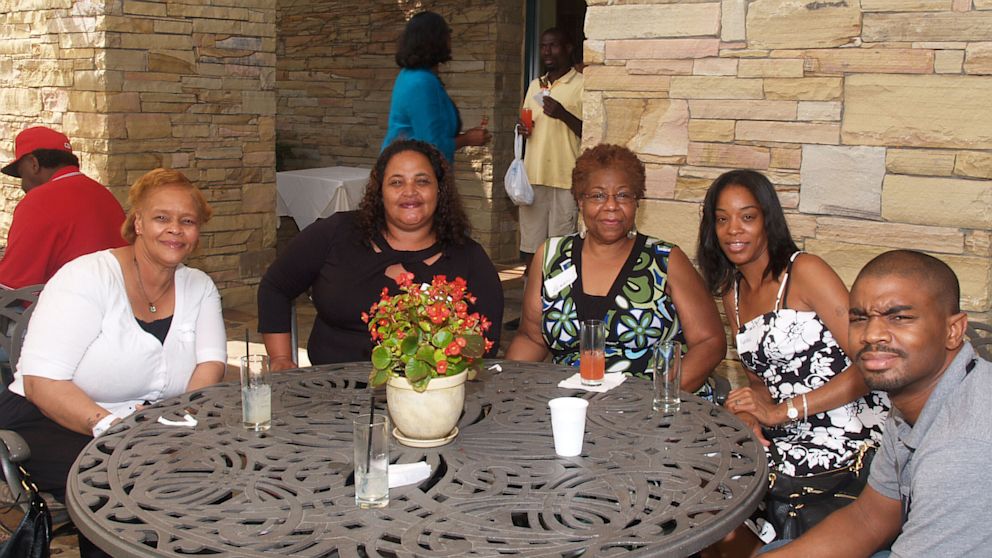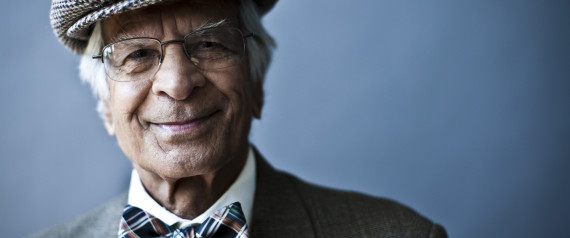
Want to add more and better years to your life? Now is the time.
We're living longer than ever: The average American born in 2013 will be alive
nearly four years longer than someone born 20 years ago. But until recently, it wasn't clear if the years we've added to our lives were
good-quality years.
A recent study from the University of Massachusetts Medical School starts to answer that question. Researchers found that today,
25 year olds can expect to live "2.4 more years of a healthy life" and 65 year olds can look forward to 1.7 extra healthy years than people who lived two decades back.
However, those extra years are far from guaranteed. Childhood obesity and its associated diseases threaten to
reverse the upward tick of American life expectancy, which is currently calculated by the Centers for Disease Control and Prevention (CDC) to be
just shy of 79 years.
Much of making it to your 100th birthday is beyond your control, as longevity is partly dictated by genetics and the medical history and health habits of your parents and grandparents. But there are also a handful (okay, a lot) of lifespan-enhancing practices that you can adopt today -- like taking your allotted vacation days, eating more leafy greens and getting enough sleep.
We scoured the research and sought advice from centenarians themselves. And while not all of these life-expanders are doable for everyone ("Be born in Japan," for example!), there is so much you
can do to improve your odds of a long and healthful old age.
Find out what you're already doing right and where you can still improve in our list of
100 ways to live to 100.
1. Be conscientious.In the book
The Longevity Project, authors Howard S. Friedman and Leslie R. Martin shared that in their research, being conscientious was one of the best predictors of longevity. That's because people who are conscientious may be more likely to abide by healthful behaviors, may be less prone to disease and may find more success in relationships and in the workplace.
2. Find reasons to laugh. In a 2012 study published in the journal Aging, researchers from the Albert Einstein College of Medicine and Yeshiva University identified
certain personality characteristics that a group of 243 centenarians had in common. Among them? A love of laughter. “They considered laughter an important part of life,” the lead researcher said.
3. Find a life purpose.In the centenarian hotspot of Nicoya, Costa Rica, residents cultivate a
plan de vida, which means “reason to live,”
according to the website Blue Zones. “This sense of purpose often centers around spending time with and providing for their family,” the site says. “This often results in centenarians retaining an active lifestyle, reaping the benefits of physical activity and exposure to the sun.”
According to Blue Zones, a 60-year-old Costa-Rican man has roughly twice the chance of living to 90 as a man living in the United States.
4. Go nuts.Eating nuts could keep you from dying early, according to a study in BioMed Central. The study, based on data from 7,000 people ages 55 to 90, showed that nut-eaters -- who in the study were more likely to have a lower body mass index and waist circumference -- had a
39 percent lower risk of early death, and walnut-eaters in particular had a 45 percent lower risk of early death.
5. Walk a lot. 
The 123-year-old Carmelo Flores Laura, potentially the oldest living person documented,
says he owes his longevity to regular exercise. "I walk a lot, that's all. I go out with the animals," Flores told the Associated Press.
6. Try a little retail therapy.Who doesn't love an excuse to go shopping?! A 2011 study found that frequent shoppers live longer. The study examined Taiwanese men and women over 65 and found that
daily shopping lowered risk of death by 28 percent for men and 23 percent of women, AARP reported. And if you're worried about the state of your wallet, you're in luck: The benefits hold up
even if you don't buy anything, WebMD reported.
7. Be happy.A 2011 study published in the journal
Proceedings of the National Academy of Sciences found that among older people, the group that scored as “happiest” (having the highest “positive affect”) had a death rate of 3.6 percent -- less than half the death rate of the unhappiest group, which was 7.3 percent.
8. Win an Oscar.Researchers from Toronto's Sunnybrook and Women's College Health Sciences Centre found that Oscar-winning actors
and directors
tend to live longer than their losing peers, with winning actors and actresses living nearly four years more than their losing peers.
9. Head for the hills.
You may hear more often about the perils of altitude sickness, but it turns out that heading to new heights may be a good move. A 2011 study from the University of Colorado School of Medicine found that the 20 U.S. counties with the highest life expectancy
had an average altitude of 5,967 feet above sea level. That added 1.2 to 3.6 years to a man's life, and six months to 2.5 years to a woman's and lowered all residents' risk of dying from heart disease, the researchers found.
10. Do unto others.Susannah Mushatt Jones is the oldest resident of New York state -- she celebrated her 114th birthday this past summer. What's her secret? According to her niece in
an interview with PIX11 news, treating everybody fairly is one of her "standards," along with taking care of others. The only medication she takes is for high blood pressure, and her diet consists of ribs, chicken, fruits and veggies, according to the PIX11 video segment.
11. But don’t forget about yourself.Fitness guru Jack LaLanne, who passed away at the age of 96 in 2011, knew the importance of looking after yourself. “This is where I take care of the most important person in my life: me,” he
joked of the gym in the documentary How To Live Forever. “Exercise is king. Nutrition is queen. Put them together and you’ve got a kindom.”
LaLanne repeated his message often. Esquire.com also quoted him as saying: “You’ve got to satisfy you. If you can’t satisfy you, you’re a failure.”
12. Put down the takeout menu. 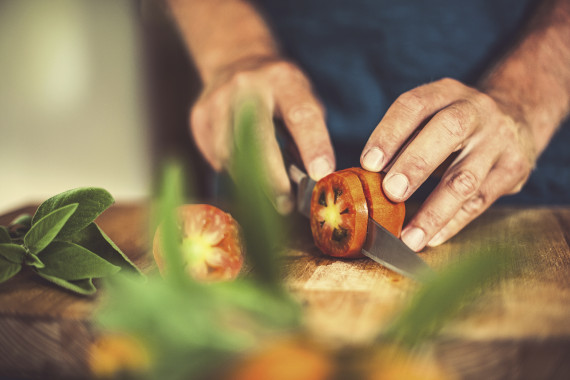
Here’s a reason to get cooking: A 2012 study published in Public Health Nutrition found that people who cook at home up to five times a week were 47 percent more likely to still be alive after a decade,
HuffPost previously reported. The researchers looked at 1,888 men and women over the age of 65 who lived in Taiwan.
13. Practice yoga. There are
some exceptional benefits to hitting the mat, including stress and anxiety relief, better balance and and increased flexibility. Just ask
yoga instructor Tao Porchon-Lynch, who, at 95-years-old, credits the practice for her long, healthy, happy life.
14. Be optimistic. The same 2012 Aging study that pointed to enjoying laughter as a possible factor in longevity also found that optimism was a personality trait linked to longer lifespans.
“When I started working with centenarians, I thought we'd find that they survived so long in part because they were mean and ornery," study author Nir Barzilai, M.D., of the Albert Einstein College of Medicine,
said in a statement when the findings were released. "But when we assessed the personalities of these 243 centenarians, we found qualities that clearly reflect a positive attitude towards life. Most were outgoing, optimistic and easygoing."
15. But maybe not overly optimistic.Elderly people may not want to view
everything through rose-colored glasses: A new study shows that older people who overestimate their future happiness have a higher risk of death and disability, compared with people who
underestimate or accurately predict future life satisfaction.
"Pessimism about the future may encourage people to live more carefully, taking health and safety precautions," study researcher Frieder Lang, a professor at the University of Erlangen-Nuremberg in Germany, said in a statement.
16. Go meatless. Vegetarians may have a
12 percent lower risk of premature death than their meat-eating peers, according to a JAMA Internal Medicine study published earlier this year. The study included 73,308 Seventh-Day Adventist men and women who do not eat meat for religious reasons.
17. Put a ring on it. Permanently-partnered Baby Boomers are
less likely to die early than their single peers, according to a Duke University Medical Center study. The findings were based on 4,800 people born in the 1940s.
18. And while you’re at it, marry someone younger. In July,
100-year-old Daisy Dunnett told SWNS.com that one key to her centenarian status might be her husband -- who's 33 years younger. The two met when she was 72, after her first husband died following 50 years of marriage, and he was 39. "I really think I would be dead if it was not for him," she said to SWNS.com. "If you’re elderly and on your own it is easy to give up and not feed yourself properly."
19. Or marry someone of the same sex.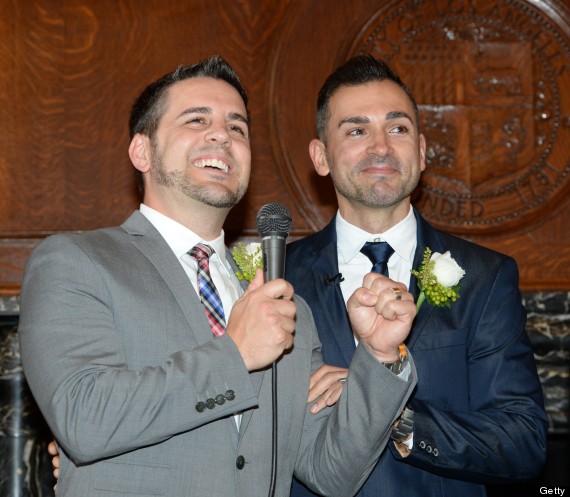
According to a Danish study,
gay men who are married have a lower mortality rate than single or divorced straight men. The study, published in the International Journal of Epidemiology, looked at the mortality rate among gay men in Denmark after it implemented a same-sex partnership law in 1989.
20. Try to keep your marriage friction-free.A relationship full of turmoil and arguments could have an impact on how long you live. Brigham Young University researchers found in their study of 1,700 married adults that the
more arguing there was in the relationship, the worse the adults' health.
21. But get divorced if it isn’t working.While a happy marriage is a good indicator of future health and longevity, all is not lost for the happily divorced -- at least among women.
“Women who got divorced, often leaving a bad marriage, tended to thrive, as did single women! In fact, even widowed women often did unexpectedly well,” Friedman of
The Longevity Project told TIME while reviewing his research findings. “Why? Women were able to rely on other friends, whereas many men depended on their wives for their social networks and so were devastated when they lost these ties.”
And that’s advice anyone can follow: Take control of your own socializing and reach out, especially if you’ve lost a spouse.
22. Brush those pearly whites. Poor oral hygiene has been associated with shortened life expectancy.
Maintaining a healthy mouth by habitually brushing and flossing can lower risks for heart disease, dementia and stroke.
23. Enjoy a cup of (Greek) joe.A daily cup of antioxidant- and polyphenol-rich Greek coffee could be the secret to living long, according to a study in the journal Vascular Medicine. Researchers from the University of Athens Medical School conducted their study on 71 men and 71 women who live on the Greek island of Ikaria -- an island where residents tend to live to age 90 or more -- and found that those who
drink boiled Greek coffee on a daily basis had better endothelial functioning than those who drank other kinds of coffee.
24. Put the pedal to the metal. 
Like with walking briskly (also on the list), the pace at which you pedal your bike might predict how long you'll live. In a 2011 study of Copenhagen cyclists,
men who pedaled fastest lived about five years longer than men who pedaled slowest. The fastest female cyclists averaged about four extra years. Among both genders, average cyclists lived somewhat longer than the slow pokes, proving the point that physical activity is good, but vigorous activity is even better.
25. Or be a super cyclist. A recent study presented at the European Society of Cardiology Congress 2013 showed that French cyclists in the Tour de France
tend to live longer than their non-cycling peers. The study included data from 786 French cyclists who participated in the race at least once between 1947 and 2012. They compared their health and causes of death with other French men in the same age range who did not participate in the Tour de France. Researchers found that their mortality rate was 41 percent lower, compared with the non-cyclists. "In the context of recent concerns regarding performance-enhancing techniques and the potential negative health effects of excessive
high-level physical activity, data on the long-term outcomes and causes of death in elite endurance cyclists is of particular interest," study researcher Xavier Jouven, M.D., Ph.D., from the Sudden Death Expertise Center in Paris, France, said in a statement.
26. Get your Mediterranean diet on. Elderly people who
eat a Mediterranean diet -- rich in healthy fats (like olive oil), fish and produce -- may have an increased lifespan, compared with their peers who don't abide by the diet. The study, published in the journal AGE in 201, showed that the chances of living longer increased 20 percent from eating a Mediterranean diet.
27. Stop smoking.As if you needed another reason to quit the habit, research shows that giving up cigarettes could
help women live 10 years longer than if they had continued smoking. The study, published in the journal The Lancet, included 1.3 million women whose health habits were analyzed between 1996 and 2001.
28. Eat your fiber.Consuming lots of fiber -- especially fiber from grains -- could help stave off early death from heart disease, infections and respiratory illness in men and women, as well as the risk of death from cancer for men, according to a huge study published in 2011 in the Archives of Internal Medicine. That research showed that
people who met dietary guidelines on fiber -- 25 grams per day for women, and 38 grams per day for men -- had a lower risk of dying over a nine-year period.
29. Have a family. Becoming a parent
Becoming a parent could help you live longer by decreasing your risk of conditions such as cancer and heart disease. However, the study, published in the journal Science & Medicine in 2010, showed that this health benefit only seemed to extend to people who had just two children.
30. But wait a few years to get started.While it might be harder for them to get pregnant,
women who have children in their 40s seem to be more likely to live to 100 than women who have children earlier in life, according to a 1997 study. It won't be physically possible for all women -- and that's the point. If a woman has not yet entered menopause in her 40s, she likely has the
anti-aging genes required to make it to that 100th birthday, the Independent reported.
31. Hope for a daughter. (If you’re a dad!)Daddy's girl? You're doing Dear Old Dad a favor. According to a 2006 study of a rural Polish population,
having daughters may increase the lifespan of fathers. In fact, for every daughter born, the dads studied lived about 74 weeks longer.
32. Hope for twins. (If you're a mom!)Those who deliver a set of twins may enjoy a longer lifespan, according to a report released in Proceedings of the Royal Society B.
The results surprised researchers,
LiveScience reported: “rather than being a reproductive accident that drains mom of energy and nutrients, twins could be an evolutionary adaption in which healthy moms take the chance to pass on double their genes at once.”
One caveat: The study was a review of accounts of childbirth in 19th century Utah, so these twin births were natural and not the result of IVF -- a common factor in multiple births in modern day.
33. Stay in school.People who
stay in school for at least 12 years have more years of life ahead of them than those who don’t complete high school, according to a Harvard University study published in 2008. The research, which appeared in the journal Health Affairs, involved analysis of data from the National Longitudinal Mortality Study.
34. Make healthy changes in your life (starting today).Adjusting your daily habits so that you eat whole foods, exercise, meditate and lean on your support system might potentially reverse cell aging. A recent study in the journal Lancet Oncology showed that making these
healthy changes to your life is associated with longer telomeres, which are the "caps" at the ends of chromosomes; shorter telomeres have been linked in past research to cell aging, as well as higher risks of age-related diseases. While the study
didn't show that healthy lifestyle changes can actually make you age backward, we'll take any news we can get that positive lifestyle choices actually pay off for our bodies.
35. Don’t dread getting older.Turns out, your outlook on aging might play a role in the number of birthdays you celebrate.
According to a study published in the Journal of Personality and Social Psychology in August, adults who developed positive attitudes about getting older lived more than seven years longer than those who had negative attitudes. Think of each candle as an accomplishment!
36. Go for the gold.
As if they needed it, here’s another reason for elite athletes to go for the gold (or bronze, or silver): Olympic medalists
live longer. Although researchers aren’t exactly sure why they tend to fare better than country- and age-matched civilians, they speculate that those lucrative endorsement deals and access to top doctors
might have something to do with it.
But not all Olympians are created equal: Those who competed in endurance events like long-distance running or games that involved technique (think: cricket, golf) were longer-lived than power-based athletes such as wrestlers and weightlifters, and contact athletes, like rugby players and bobsledders (though all groups had an advantage over non-athletes).
37. Be Japanese.People who are born in Japan have the
longest average life expectancy, according to the most recent World Health Organization data from 2011. Girls born in Japan in 2012 can be expected to live to 86.41 on average. (However, a recent study in The Lancet suggested that Japan's life expectancy
may soon be outpaced by other countries, including Sweden, Italy and Australia.)
38. Lay off the vitamins.While
many health professionals advocate taking vitamins to help prevent deficiencies in vital nutrients, a Copenhagen University review of 815 clinical trials found that taking supplements
had a detrimental effect on lifespan. The studies investigated the health benefit of common supplements, reported BBC, and found a relationship between taking some of these supplements and risk of all-cause mortality. As BBC reported, those who took beta-carotene had a 7 percent increased risk and vitamins A and E incurred a 16 percent and a 4 percent increased risk, respectively. What’s more, a separate study found that older women increased their risk of cardiovascular or cancer death by
taking a daily vitamin -- especially an iron supplement.
But ask your doctor before you ditch your daily dose: Critics of the study point out that those who take a regular vitamins may have preexisting conditions that affect longevity and have nothing to do, directly at least, with the pills themselves.
39. Take a cue from the Latino community.Researchers call it the “Hispanic paradox”: Despite lower average income, health insurance, education and other measures of socioeconomic status, people who identify as Hispanic live an average 2.5 years longer than the overall American average,
according to government research. Why? Researchers aren’t sure, but one theory relates to the influence of traditional Latin American values, like family togetherness.
Reported New America Media:
A smattering of evidence suggests that many Latino community environments discourage high-risk behaviors, such as excessive smoking, high alcohol consumption and heavy use of mind-altering chemicals that may threaten lifespans. Social reinforcement, providing comfort and support, mixed with community-based practical assistance, contribute to a healthy lifestyle.
40. Go to church.
Attending weekly religious services can tack on an extra 1.8 to 3.1 years on to your life expectancy, according to a review of research published in 2006 in the Journal of the American Board of Family Medicine. This longevity benefit could lie in
church's stress-relieving benefits, though it's also possible that "being in a religious community helps you make meaning out of your life," the researcher of that study, University of Pittsburgh Medical Center's Daniel Hall, told LiveScience.
41. Drink alcohol. (But only in moderation!)Drinking just one or two glasses of alcohol a day could help middle-aged and older adults live longer, according to a 2010 study in the journal Alcoholism: Clinical and Experimental Research. However, it's
all about the moderation -- the study also showed that heavy drinkers had a 42 percent increased mortality risk. "Older persons drinking alcohol should remember that consuming more than two drinks a day exceeds recommended alcohol consumption guidelines in the United States and is associated with increased falls, a higher risk of alcohol use problems and potential adverse interactions with medications," study researcher Charles Holahan, of the University of Texas at Austin, said in a statement.
42. Get fishy.Consuming lots of omega-3 fatty acids -- which are found in fish, as well as some
vegetables and seeds -- could boost your longevity. A Harvard School of Public Health study showed that older people with the
highest levels of omega-3s in their blood had longer lifespans by 2.2 years (on average) than those with low omega-3 blood levels.
43. Help someone else.Volunteers may live longer than people who don't give of their time, according to a University of Michigan study. However, there's one catch: the volunteering has to be done for the
purpose of helping others, versus helping yourself.
44. Take off.
In case you’re feeling particularly guilty about taking your vacation days, consider this: An analysis of the famed
Framingham Heart Study showed that the
more frequently men took vacations, the longer they lived.
45. Get busy.Spending a little extra time between the sheets may add years to your life. A 2010 study of 1,165 middle-aged men showed that having sex once a month or less is linked with a
45 percent higher risk of heart disease than having sex two to three times a week, WebMD reported. And women who enjoy sex
may live up to eight years longer than women who don't.
46. Get enough sleep.It's time to stop burning the candle at both ends.
People who don't get enough sleep die younger of any cause than people who get sufficient shut-eye. In a 2010 study, men who got fewer than six hours of a sleep a night were
four times more likely to die over a 14-year period. The study's authors wrote that this link is "a risk that has been underestimated."
47. But not too much sleep. You don't want to cut your sleep short, but you don't want to overdo it, either. A number of studies suggest that more than nine hours in the land of nod can increase your risk for a number of serious health conditions, as well as earlier death. One study found that long sleepers faced a
30 percent higher chance of premature death than people who slept around seven to eight hours a night.
48. Get a pet.
If you need another reason to get a pet -- besides, you know, unlimited adorableness and unconditional love -- consider this: Research shows that both cat- and dog-owners
tend to live longer than their petless peers.
One study found that owning a cat could cut your risk for heart attack by nearly one third. Another discovered dog-owners (and even just dog-petters)
cope better with depression and certain stress-related disorders. And to reiterate:
The cuteness!
49. Join the 1 percent.Yep, rich people live longer. In
findings that surprise no one, a padded bank account is strongly correlated to longer life expectancy, thanks to a myriad of factors that include (but are not limited to): Better access to education, which is associated with longevity in its own right; access to health care; and lower risk of violent crime. What’s more, some researchers suggest that health creates wealth: Those who are well can work, accumulating resources that, in turn, keep them healthy,
reported U.S. News and World Report.
The health-wealth index is not limited to individuals, either. Countries with higher GDPs have
longer-lived citizens.
50. Eat broccoli.Barack Obama’s favorite food may help him hang around long enough to meet Malia and Sasha's grandkids.
One study found that those who munched on plants from the mustard family -- like broccoli, cauliflower and cabbage -- tend to live longer lives. Researchers suggest this may be tied to the high vitamin C and nutrient count in these kinds of veggies. Broc on, Barack!
51. Run -- but not too much.Turns out there really can be too much of a good thing. A moderate jogging habit
can add between five and six years to your life, according to 2012 analysis of data from the Copenhagen City Heart study. But according to research from the University of South Carolina, people who run more than 20 miles a week, faster than 7 miles an hour, or more than five times a week
seem to lose the longevity boost.
52. Wash your hands.It sounds silly, but washing your hands could save your life. In fact, a 2005 study
cited by the World Health Organization estimates that hand-washing could
save more lives worldwide than any vaccine or other medical intervention.
53. Drink your coffee -- but in moderation.
There's a lot good about your cup of joe: Coffee is high in antioxidants, it could
decrease your risk for diabetes and
it's even linked to a lower depression risk in women. And yet, it might be best to keep your cup count under four: A long-term study published in the journal Mayo Clinic Proceedings found that those who drank an average of more than four cups of coffee a day were at a 21 percent higher risk for death than those who sipped more moderately.
54. Buddy up at the office.Making friends at work is good for more than productivity. Tel Aviv University researchers followed 820 adults for 20 years and found that the ones with the most social support from coworkers lived the longest. The lone wolves with no pals in the office? They were
2.4 times more likely to die during the study.
55. Be a woman.Women live an average of
five to 10 years longer than men in industrialized countries. And 85 percent of centenarians are female, longevity researcher Tom Perls told TIME in 2008. There's little conclusive evidence as to why, however. A recent study suggested it may be because
women have more robust immune systems. Other theories have ranged from men experiencing more work stress to
women choosing healthier nutrition habits.
56. Grow from trauma.In an astounding display of resiliency, a study showed that
male Holocaust survivors lived longer than men of the same age group who immigrated to Israel before Nazi rule. The study's authors write that this counterintuitive finding could be a display of "post-traumatic growth,” leading these men to "greater meaning and satisfaction in their later lives."
57. Keep busy.While many look forward to retiring, the best way to enjoy one’s golden years may be to keep working. Among the men who were subjects of Harvard’s famed Longevity Project, those who made it into old, old age had successful, satisfying careers and continued to work -- at least on a part time basis -- into their 70s,
Slate reported.
58. Don’t take it sitting down.By now, we all know that sitting all day is damaging our health, but according to one study, it could even affect your lifespan. According to a theoretical analysis of existing data, published in BMJ Open,
sitting for fewer than three hours per day could add two years to your life.
59. Cultivate your green thumb.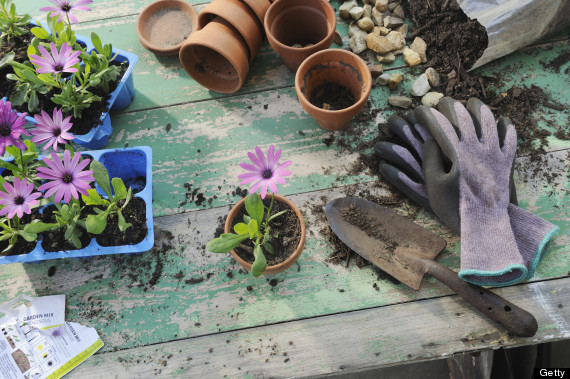
Almost all of Okinawa's famed centenarians share the same hobby: These long-living inhabitants of the well-documented Blue Zone
grow (or once grew) gardens. Not only is it a calming, low-impact physical activity, it can also provide a steady stream of homegrown fresh produce.
60. Pick up the pace. Have a friend or family member you just can’t keep up with? Natural speed walkers have an edge, and not just for calling shotgun.
The fastest walkers seem to live the longest, according to a study of over 34,000 older adults from 2011. Unfortunately, powering up your next walk around the block won't exactly add candles to your birthday cake. It appears to be your
natural walking speed that predicts lifespan and not something you have much control over, researcher Stephanie Studenski told Discovery News.
61. Smile.It's not just that optimistic spirit that keeps you going. The actual size of your smile might make a difference. In a
2010 study, researchers examined smile intensity among a series of photos of baseball players from the 1950s. Of the players who had died during the years 2006 to 2009, those with no smile in their picture lived an average of 72.9 years. The biggest smilers, on the other hand,
lived 79.9 years.
62. Hit the gym.If this doesn't convince you that you
need to exercise, nothing will: Meeting (or exceeding) the World Health Organization's recommendation to get 150 minutes of moderate exercise a week
can add about four years to your life, compared to never exercising, US News reported. Even just getting half the recommended amount of gym time can tack on about two extra years.
63. Take it easy on processed meats.It’s obvious that nutrition plays a big role in longevity, but it isn’t just what you eat -- it’s also what you
don’t eat. While you're busy adding omega 3s and antioxidant-rich produce, you might want to consider cutting back in one area: processed meats. A 2013 study linked a diet heavy in processed meats -- like sausage and bacon -- to a
higher risk of dying from cancer and heart disease.
64. Avoid the gridiron.Slowly but surely, science is helping us unravel the true dangers of playing professional football. Among this growing body of research is a
2012 study that found that professional football players are
four times more likely to die of Alzheimer's disease or amyotrophic lateral sclerosis (ALS).
65. Have a little extra. (But steer clear of obesity!) In research that defies the conventional wisdom, overweight people are
less likely to die from any cause than are normal, underweight and obese people. Researchers found that having a BMI between 25 and 29.9, a measure that describes about 30 percent of the U.S. population,
was associated with longer life.
66. Take the stairs.
Do yourself a favor and bypass the elevator (you didn't really have the time to stand there and wait for it anyway, did you?). Researchers from the University of Geneva calculated that among people with a sedentary lifestyle, simply
taking the stairs instead amounted to enough physical activity to burn body fat and lower blood pressure enough to cut their risk of an early death by 15 percent.
67. Get a Nobel Prize.Much like Olympians and Oscar winners, the learned men and women who win the Nobel Prize have a leg up, longevity-wise, on the rest of us,
according to research from Cornell University. They even have a leg-up on Nobel finalists who do not win the actual prize, living one or two years longer, on average, than the runners-up. One theory may be that Nobel Laureates have a perceived higher social standing than those who do not win. The higher one’s social standing, the lower his or her stress, suggests this theory. And that has a real advantage when it comes to longevity.
68. Slow your resting heart rate.A fast heart rate may be a sign that you’ll meet an earlier end, according to a study in the journal Heart. Danish researchers discovered that a key predictor of long life in otherwise-healthy middle-aged and elderly men was
resting heart rate -- regardless of fitness level or other health behaviors.
69. Win the genetic lottery.You can do everything right when it comes to your future health and long life, but about one-third of the factors that relate to longevity
are in your genes, The New York Times reports. Mothers, in particular, play an important role in
determining lifespan by passing on genetic mutations that relate to the aging process. according to a study conducted by the Karolinska Institute.
70. Believe in your own good health.Researchers often ask elderly patients to
rate their own health. Those who report feeling crummy actually have a higher risk of death than those who self-assessed as “excellent,” “good” or “fair.” While much of that is likely because these people accurately assessed that they were unwell, it certainly doesn’t hurt to have a positive outlook.
71. Don’t rush to first grade.
Most states or school districts dictates when a child is ready to hit the books, but in certain cases, parents will push or delay their son or daughter's first day in first grade. But according to a 2008 study,
starting first grade before age six is linked to earlier mortality.
72. Think about... death.It sounds counter-intuitive, but contemplating your mortality may actually help you live a longer life.
According to research in the Personality and Social Psychology Review, being self-aware about our inevitable passing impacts our compassion for others.
Even more, studies have shown that when we're reminded of death, we're more likely to make better decisions about our own health, like using sunscreen, smoking less and exercising more.
73. Turn off the TV.Here's a frightening factoid:
Every hour of TV you watch after age 25 cuts your lifespan by about 22 minutes, according to 2012 research from The University of Queensland, Australia. They also found that people who average six hours a day in front of the boob tube died nearly five years sooner than people who didn't watch any TV.
74. Tune in.Too much TV is no bueno (see above), but consuming mass media -- TV, newspapers, Internet -- in search of
information is a saving grace. Researchers
followed the news-gathering habits of more than 1,100 Italian adults and found that people with the
most media exposure were also the healthiest eaters (sorry, but "Friends" reruns don't count). And of course, we all know that we are what we eat.
75. Cut the sugar.Got a sweet tooth? It’ll cost you. Researcher Cynthia Kenyon, a geneticist at the University of California, San Francisco, decided to give up sweets after she discovered that a sugary diet cut the
lifespan of roundworms by 20 percent. Sure, it isn’t quite as definitive as a study in humans, but when a longevity researcher makes a dramatic change to improve her health, we listen up!
76. Choose your job wisely.If you’re planning on a long life and you have the freedom of choice, you may want to avoid
these careers, which count among the deadliest in America. According to the Bureau of Labor Statistics‘ National Census of Fatal Occupational Injuries, there were 4,383 fatal work injuries in 2012 alone, Forbes reported.
77. Eat an Andean diet.Bolivian farmer Carmelo Flores made headlines when he attributed his 123 years to a traditional Andean diet of superfoods, like
quinoa, mushrooms and coca. But according to HuffPost blogger and nutritionist Andy Bellatti, it isn’t the individual foods that likely contributed to Flores’ long life -- it is simply
the absence of modern, processed foods. “The notion that simply eating [a superfood] is the key to health is reductionist and silly if one's diet is otherwise largely composed of highly-processed and refined food products,” wrote Bellatti in a blog post.
78. Move to the aloha state.
In addition to being the happiest and least-stressed state in the country, Hawaii also boasts greater longevity than any other U.S. state. A 65-year-old in Hawaii will go on to live another 16.2 years on average, as compared to another 10.6 years in Mississippi, the state with the lowest longevity rankings, according to recent
Centers for Disease Control and Prevention data.
79. Or choose the Dakotas.While Hawaii might have the greatest life expectancy among the 65-and-older set, North Dakota has the
highest rate of centenarians per capita, followed closely by (you guessed it)
South Dakota. The effect of your locale on your longevity is likely due to a confluence of
socioeconomic factors, reports U.S. News and World Report, although no one is certain why the Dakotas have such a long-lived population.
80. In the face of bad health, keep a positive attitude.It's all about looking on the bright side! A recent study in the journal Circulation: Cardiovascular Quality and Outcomes showed that
heart disease patients who keep positive attitudes are more likely to exercise
and live longer than their less-positive peers. The findings suggest that "we should focus not only on increasing positive attitude in cardiac rehabilitation, but also make sure that patients perform exercise on a regular basis, as exercise is associated with both increased levels of optimism and better health,” study researcher Susanne S. Pedersen, Ph.D., a professor of cardiac psychology at Tilburg University, said in a statement.
81. Eat less.Women from Okinawa, Japan enjoy the longest disability-free life of any population on Earth -- and the rest of the world has been looking to the population for its longevity secrets. One is the Okinawan habit of beginning meals with the phrase, “Hara hachi bu,” which means, “Eat until you are 80 percent full,” Dan Buettner, author of The Blue Zones, a book on the science of longevity,
told New America Media. Restricting calories and never overeating is one reason that the Okinawan population has such a large concentration of centenarians,
Buettner explains.
82. Get up when you fall. 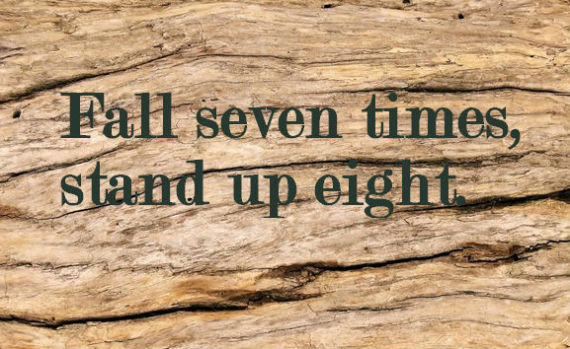
Psychological resilience -- that is, the ability to effectively cope with life’s challenges rather than being beaten down by them -- has been linked with increased well-being and longevity.
“Research into the psychology of aging shows that psychologically resilient adults cope well with an aging body,”
says Al Siebert, PhD, author of The Resiliency Advantage. “When they lose friends or loved ones they express their feelings in an open, healthy way.”
83. Get a mammogram.Women face a higher risk of death when cancer isn’t detected early: A
recent Washington University study found that women diagnosed with breast cancer in their 40s who died from the disease were more likely to have never had a mammogram than older women.
84. Have a happy childhood.
Experiencing a traumatic incident in as a child could actually make you more likely to die early, according to
a study by the French National Institute of Health and Medical Research (INSERM) and University College London. Women in particular who experienced a traumatic event before reaching age 16 had a 66 percent higher chance of dying before reaching age 50.
85. Live a spiritual life.In WebMD’s
2008 survey of centenarians, 84 percent say that staying in touch with one’s sprituality is “very important” for healthy aging. Whether it’s being part of a faith-based community or maintaining your own meditation practice, finding what spirituality means to you could help you enjoy more of your golden years.
86. Find the healthy hobbies that make you light up -- and do them.Salustiano "Shorty" Sanchez,
who lived to the impressive age of 112, found pleasure in "gardening, crossword puzzles and nightly gin rummy games with friends,"
according to Guinness World Records. His hobbies, whether he knew it or not, had some major health benefits. Finding respite in these kinds of simple, productive activities
can help to relieve stress and provide a sense of accomplishment, both of which can contribute to a long, happy life.
87. Practice positive self-talk. Ninety-four-year-old yogi Tao Porchon-Lynch says that repeating positive affirmations to herself is a part of what has kept her feeling young, even into her 90s. "My mantra is to wake up the morning and say, 'This is going to be the best day of my life,'" Porchon-Lynch
told the Huffington Post in May. "That way I can face anything. My mantra for life is, 'There is nothing that you cannot do.'"
88. Be a city-dweller.Recent results from the Country Health Rankings show that
urbanites tend to live longer and healthier than their rural counterparts. That's because of higher rates of cigarette use, obesity, and chronic health conditions (such as diabetes and hypertension) among people who live in rural areas, the Wall Street Journal reported.
89. ...But living in the country can be good, too (if you're British).The U.K.'s Office for National Statistics reported in 2010 that
rural residents in Britain live longer than their city-dwelling peers -- two more years for men, and one-and-a-half more years for women, according to The Guardian. Plus, the countryside seemed to be associated with a closing of the life expectancy gap between rich and poor.
90. Take a mid-day snooze. Regular siestas
Regular siestas -- combined with genetics and consuming a healthy produce- and fish-heavy diet -- could be the key to living longer, if the long-lived residents of Ikaria island are any indication. Agence France-Presse reported 10 times as many residents on Ikaria are older than 90, compared with the rest of Europe.
91. Be a knockout.Research from the University of Waterloo showed an association between attractiveness and longevity. Researchers had student study participants look at 50 photos of 17-year-olds from the 1920s, and rate them on their perceived attractiveness and healthiness. Researchers found that the ones who
scored higher in attractiveness lived longer -- to 76, on average -- than their less-attractive counterparts (who lived on average to 69), The Houston Chronicle reported.
92. Breastfeed your baby.Women who breastfeed their babies could lower their own chances of death from cancer, heart disease and other conditions, according to a study in the American Journal of Clinical Nutrition. Yahoo! Shine reported that the risk of dying from heart disease is 8 percent lower and the risk of dying from cancer or other diseases is together 17 percent lower for women who
breastfeed exclusively for at least six months. "Longer breastfeeding means fewer menstrual cycles and reduced lifetime exposure to the hormonal factors, especially estrogen, that influence breast cancer risk," Susan Higginbotham, director of research for the American Institute for Cancer Research, told Yahoo! Shine. "Physical changes in breast tissue that accompany milk production provide some protection as well."
93. Be driven.Sen. Dianne Feinstein, the oldest and longest-serving senator currently in Congress, believes that age is nothing but a number. Instead, staying sharp, healthy and -- above all -- motivated is the key to a long and fruitful life:
"You can be very old at 50 and you can be very young at 90. I really believe that. It depends on your brain, it depends on your health, it depends on your drive, on your determination and your motivation," Feinstein told the San Francisco Chronicle.
94. Stay active.Take it from the iconic funny lady Betty White, who, at age 91, is still "good and energetic." She told People magazine last year that she owes her health to being "
active all the time. I think that forces you to stay well. To be 90 … and still be working -- that's what I wouldn't have expected. I'm the luckiest broad on two feet."
95. Take the plunge.
Swimming may be the sport to beat when it comes to longevity. A study in the International Journal of Aquatic Education and Research showed that compared with running, walking or being sedentary,
swimming cut death risk for men by 50 percent.
96. Putter.Your ability to move and get around is a good indicator of healthy aging, according to a review of studies in
the Journal of the American Medical Association. "The review confirmed that increased physical activity and exercise are
extremely important for healthy aging," study researcher Cynthia J. Brown, M.D., of the University of Alabama at Birmingham, said in a statement. "We've also identified mobility-limiting risk factors and created an approach to help medical professionals screen for and treat those risk factors."
97. Use your brain.Another long-life secret of the Okinawans is keeping their brains actively engaged with games and intellectual stimulation. A
2008 WebMD survey found that 89 percent of centenarians keep their minds active.
98. Finish college and then consider grad school.An education enriches your life -- and it may help to make it longer, according to a Centers for Disease Control and Prevention analysis. Earning a bachelor's degree or higher was associated with nine additional years of life, compared to earning only a high school diploma.
"Highly educated people tend to have healthier behaviors, avoid unhealthy ones and have more access to medical care when they need it," lead author, Amy Bernstein
told USA Today.
99. Live in a blue state. The 13 U.S. states with the lowest life expectancy were also reliably Republican-leaning states in Presidential elections, according to a Daily Beast
analysis of government data.
100. Be creative.Recent research on U.S. military veterans suggests that
creative-types may enjoy longer life -- those who had the highest measure of creativity reduced their mortality risk by 12 percent. (
Critics of the study point out that the results can only be extrapolated to a very specific population, as 90
